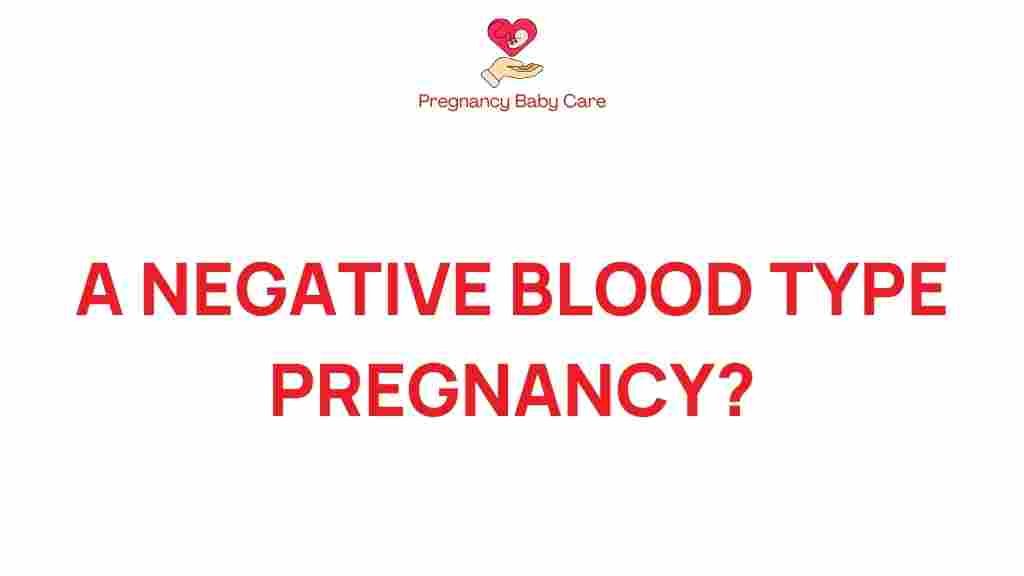Pregnancy is a beautiful journey filled with anticipation and joy, but it can also bring about concerns, especially for expectant mothers with a negative blood type. Understanding how your blood type can influence your pregnancy is crucial for ensuring maternal health and minimizing pregnancy complications. In this comprehensive guide, we will explore the relationship between negative blood types and pregnancy, the Rh factor, potential pregnancy risks, and the importance of prenatal care.
Understanding Blood Types and the Rh Factor
Your blood type is determined by the presence or absence of specific antigens on the surface of your red blood cells. The most well-known blood group systems are A, B, AB, and O, and each can be either Rh positive (+) or Rh negative (−). This leads to the following blood type classifications:
- A+
- A−
- B+
- B−
- AB+
- AB−
- O+
- O−
If you have a negative blood type, it means you lack the Rh factor, a specific protein that can lead to complications in pregnancy if not managed properly. When an Rh-negative mother is carrying an Rh-positive baby, her body may produce antibodies against the baby’s blood cells, which can lead to a condition known as Rh incompatibility.
Pregnancy Complications Linked to Negative Blood Types
Expectant mothers with a negative blood type should be aware of the potential pregnancy complications associated with Rh incompatibility. Some of the risks include:
- Hemolytic Disease of the Newborn (HDN): This condition occurs when the mother’s immune system attacks the baby’s red blood cells, leading to anemia, jaundice, or even more severe health issues.
- Miscarriage: In some cases, Rh incompatibility can increase the risk of miscarriage.
- Stillbirth: Rarely, severe cases of Rh incompatibility can lead to stillbirth.
Being aware of these risks allows expectant mothers to take proactive steps to ensure a healthy pregnancy.
Importance of Prenatal Care
Regular prenatal care is essential for all pregnant women, but it is especially critical for those with a negative blood type. Here’s why:
- Early Identification: Your healthcare provider can perform blood tests to determine your blood type and the Rh status of your baby. This information is essential for monitoring potential complications.
- Monitoring Antibody Development: If you are Rh-negative, your healthcare provider will monitor whether you have developed antibodies against Rh-positive blood. This is typically done through a blood test called an antibody screen.
- Rh Immunoglobulin Injection: If you are Rh-negative and your baby is Rh-positive, your doctor may recommend an injection of Rh immunoglobulin (RhoGAM) around the 28th week of pregnancy and after delivery. This injection helps prevent your body from producing antibodies against the Rh factor.
Regular check-ups and following your healthcare provider’s advice significantly reduce pregnancy complications and improve maternal health.
Blood Type Compatibility and Pregnancy Risks
Understanding blood type compatibility is vital for expectant mothers. Here’s a breakdown of how different blood types can interact:
- If both parents are Rh-negative, the child will be Rh-negative.
- If one parent is Rh-positive and the other is Rh-negative, the child has a 50% chance of being Rh-positive.
- If the mother is Rh-negative and the baby is Rh-positive, there is a risk for complications.
Being informed about blood type compatibility helps parents-to-be prepare for any necessary interventions during pregnancy and delivery.
Step-by-Step Process for Expectant Mothers with a Negative Blood Type
If you have a negative blood type, here’s a step-by-step process to ensure a healthy pregnancy:
- Confirm Your Blood Type: During your first prenatal visit, your healthcare provider will determine your blood type and Rh status.
- Know Your Partner’s Blood Type: Understanding your partner’s blood type can help assess the risk of Rh incompatibility.
- Regular Screening: Attend all prenatal appointments. Your healthcare provider will perform regular blood tests to check for antibodies.
- Receive Rh Immunoglobulin: If you’re Rh-negative and your baby is Rh-positive, receive the RhoGAM injection as recommended.
- Monitor Symptoms: Be aware of any symptoms such as increased fatigue or jaundice in your baby after birth, and communicate them to your healthcare provider.
Following these steps can help ensure that both you and your baby remain healthy throughout your pregnancy.
Troubleshooting Common Concerns
Even with the best prenatal care, some expectant mothers may have concerns regarding their negative blood type. Here are some common concerns and how to address them:
- Concern: I heard that having a negative blood type means I can’t have a healthy pregnancy.
Response: Many women with negative blood types have healthy pregnancies. Regular prenatal care and appropriate interventions can mitigate risks. - Concern: What if I didn’t get the Rh immunoglobulin injection?
Response: If you suspect you did not receive the injection, consult your healthcare provider as soon as possible for guidance on next steps. - Concern: How will I know if I have developed antibodies?
Response: Your healthcare provider will perform routine blood tests to monitor for antibody development throughout your pregnancy.
Staying informed and communicating with your healthcare provider can alleviate concerns and help you manage any complications effectively.
Conclusion
Pregnancy with a negative blood type can present unique challenges, but with the right knowledge and care, expectant mothers can navigate these challenges successfully. Understanding the implications of the Rh factor, maintaining regular prenatal check-ups, and being proactive about maternal health are essential steps in ensuring a healthy pregnancy.
By following the guidelines outlined in this article, you can effectively manage pregnancy risks associated with your negative blood type. Remember, open communication with your healthcare provider is crucial for addressing any concerns that may arise.
For further reading on maternal health and pregnancy tips, visit this resource. If you’re looking for additional support, you can find community forums for expectant mothers here.
This article is in the category Pregnancy and created by PregnancyBabyCare Team
